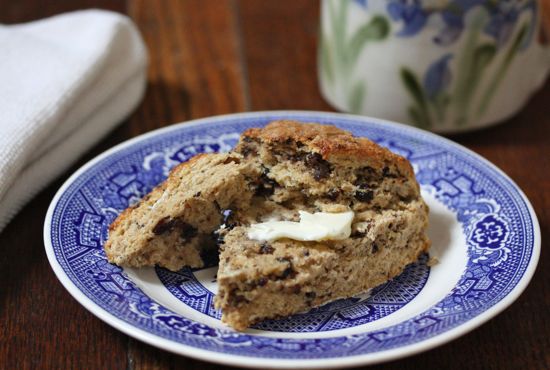I had been meaning to make Irish soda bread in honor of St. Patrick this week when an offhand note in the recipe sent me off in a new direction.
In the introduction to his Irish soda bread recipe in “Home Baking” (Artisan, 2003), food writer and world traveler Jeffrey Alford mentions making scones at the impromptu boarding house he once ran in Ireland. The buns sounded like much more fun than the traditional loaf. There’s nothing I like better than scones for breakfast and these were packed with whole grains.
They come together quickly and cook much faster than loaves, too. While you’re still waiting for a loaf to come out of the oven, you could be munching on a hot scone slathered in melting butter. Add a little jam and life is very good, indeed.
Alford offered no instructions for making the scones, aside from adding a little extra sweetener to the dough. So I had to wing it. First, I cut the recipe by a third to make a more manageable batch. Then I cut the salt, increased the sugar, substituted buttermilk for the soured milk, and added a cup of plump currants. I glazed them with an egg wash, sprinkled a little more sugar over the top and popped them into the oven.
The resulting scones were substantial but flaky and tender – unlike the rocks passed off as scones at coffee shops across America. With whole wheat and oatmeal, they offered more flavor and texture, too. (I used whole wheat pastry flour because I had some on hand, but Alford calls for regular whole wheat.) With butter, they were heavenly.
The little bit of oatmeal seems to keep them moist longer than usual, too. They were still quite good the next day.
Although I like these scones slightly sweet for breakfast, a savory variation would be good for supper as well. If you’d like to serve some with your corned beef and cabbage on St. Paddy’s Day, just cut the sugar down to 2 tablespoons and leave out the currants. Skip the dusting of sugar on top, too.
Of course, you could just make it into a loaf and bake it for about an hour. But I’ll stick to the scones and thank the Irish for one of the simple pleasures in life.
Makes 8 large wedges
1 cup dried currants
2 cups whole wheat pastry flour
2 cups unbleached all-purpose flour
3 tablespoons regular rolled oats
1 teaspoon salt
1 1/4 teaspoon baking soda
1/4 cup brown sugar
1/2 cup (1 stick) cold unsalted butter
1 1/3 cup buttermilk
1 egg
1-2 tablespoons granulated sugar
Place a baking stone, if you have one, on the center rack of the oven and preheat to 375 degrees. Meanwhile, put currants in a small bowl and cover with boiling water to plump. Let stand for about 10 minutes while you assemble the other ingredients, then drain.
Place the flours, oats, salt, baking soda and brown sugar in a large bowl and whisk to blend well. Cut butter into 1/2-inch pieces and scatter over the flour mixture. Using a pastry cutter or your fingers, work the butter into the flour until the mixture is the texture of coarse cornmeal. Don’t worry about smoothing out every lump of butter – you just want them to be very small and evenly distributed.
Form a well in the middle of the flour mixture, pour in the buttermilk, and stir with a wooden spoon to mix. When most of the flour has been incorporated into the dough, stir in the plumped currants. Dump the heavy, wet dough onto a lightly floured surface and knead a few time to bring it together into a ball.
Form the dough into a thick, flat disk about 8 inches in diameter. Cut into 8 equal wedges and transfer to a baking sheet lined with parchment. Whisk egg with about 1 tablespoon of water in a small bowl and brush this wash over the top of each wedge. Sprinkle evenly with granulated sugar.
Bake scones for about 20 minutes, until golden brown and no longer soft to the touch. Cover lightly with foil in the last few minutes of baking if scones are browning too quickly.
Serve immediately with butter and jam.
Inspired by “Home Baking” by Jeffrey Alford and Naomi Duguid.

